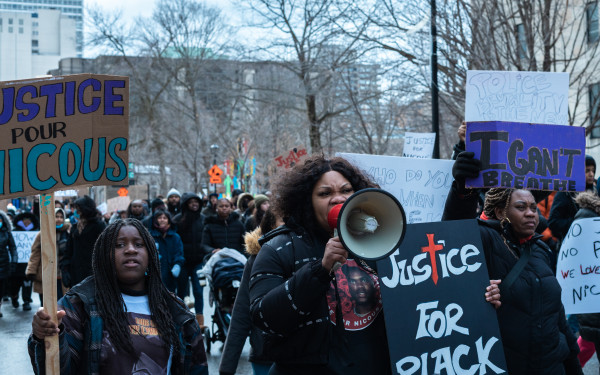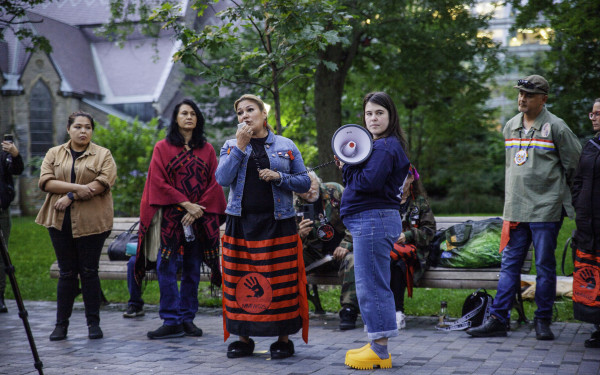Nicous D’André Spring: Not an Exception
How Quebec’s Prison System Kills Black Men
Content warning: This article contains graphic details related to violence, death, and prison conditions which may be difficult for some readers.
“In your last piece of strength, you're screaming, ‘I need help, I need help, I need help,’ and they don't help you—and then you die in that cell.”
This is how Nicole Celleste George imagined what the last few moments of her late friend, Nicous D’André Spring, looked like. “This is something that should have never happened,” she said.
Spring died on Dec. 25, 2022 in a hospital. The day prior, he was pepper sprayed and hooded with a spit mask while at Bordeaux prison in Montreal. He was supposed to be released on Dec. 23, making his detention illegal at the time of his death. He was 21 years old.
For many in the Black community, Spring’s death is unsurprising; it represents yet another person of colour killed by Quebec’s justice system. Despite his family’s pleas for justice, accountability, and systemic change, barriers within state institutions have made their fight nearly impossible.
Spring’s death, his family, friends, and supporters have argued, represents a larger cog in a machine designed to oppress, marginalize, and dehumanize Black people. For decades, Quebec’s prison system has acted as the ideal breeding ground for racial violence and subversion of human rights.
On Nov. 1, 2022, the Office of the Correctional Investigator of Canada published its 2021-22 annual report illustrating the disproportionate and discriminatory treatment of Black people within the prison system.
The investigation found that 12 per cent of Black inmates reported being “over-involved in use of force incidents, regardless of risk level, security level, age, sentence length or gender.” The report also indicated that Black inmates are more likely to be “labelled or treated like gang members” and targeted by staff. Investigators found that Black inmates were more frequently written up for discretionary offences and punished more severely.
Christophe Lewis, an advocate for prison reform, is critical of how the prison system operates in Canada. He said that the inhumane conditions prisoners are forced to live in, as well as the continuous violation of inmates’ human rights, is reflective of how violent the system is.
He believes that the problem is rooted in how the system views inmates. “[Prison guards] look at prisoners as their adversaries. So when you're dealing with your adversaries, you're never going to be completely kind to them,” he said.
Lewis is all too familiar with the excessive force used on inmates. In 2012, while at Millhaven Institution, a federal prison in Ontario, Lewis was brutally assaulted by approximately 30 correctional officers. He was pepper-sprayed and put in an illegal chokehold, unable to breathe until he passed out.
In his blog, Freedom is a Must, Lewis described this three-minute attack as “unprovoked, vicious, and excessive.”
Lewis described being forced to live in solitary confinement for 23 hours a day at the mercy of his assaulters. Most of the officers involved in his assault kept their jobs, got promoted and continuously blamed him for the incident, he recounted. For Lewis, the use of excessive force is not the only indicator of a broken system.
“My family is demanding the video [of the altercation] to be released to us and the public because it’s been over a month now that we’ve been waiting.” — Sarafina Dennie
These problems are not unique to Ontario prisons. Having served time in Quebec, Lewis emphasized that the conditions in prisons, like Bordeaux, are extremely harsh.
“I’ve seen people get the life beat out of them in prison. I've seen people get shot and killed by the guards in federal prisons,” he said.
All inmates are vulnerable to this type of treatment, but people of colour are disproportionately affected, Lewis described. “There's some ruthless staff members that just don't care, and look at Black lives as a nuisance” he added.
For him, the brutality of the Bordeaux correctional officers towards Spring is almost routine. “I was fortunate to walk away with my life. A lot of people are not fortunate to walk with their life,” Lewis told The Link. “Case in point, someone like Nicous Spring wasn't fortunate. He was killed in the hands of those that are there to protect him.”
Bordeaux is one of Quebec’s largest and most infamous detention centres.
According to Svens Telemaque, the support services counsellor for DESTA, a Black Community Network that works closely with current and former inmates at the prison, the conditions inside Bordeaux are abhorrent.
As of 2021, Quebec’s Public Security Ministry disclosed that Bordeaux contained 1,021 inmates.
Resources within the prison system are allocated to punitive practices over rehabilitation programs. For Telemaque, this approach severely harms inmates. They are “not getting any programs […] that could benefit them when it comes to rehabilitation,” he said.
Additionally, the seclusion of inmates further harms their mental health, he adds. The prison’s high suicide rates illustrate this best. A 2021 report from Quebec’s bureau department stated that Bordeaux alone had 15 suicides and 32 attempts since 2011.
This reality, coupled with inmates’ limited access to loved ones, furthers the harm of isolation. “Specifically at Bordeaux, it's hell just to get a [family] visit,” Telemaque added. “People are basically secluded to their cells 18 to 20 hours a day [to maintain order],” he said.
The lack of systemic support to reintegration contributes to the 55 per cent recidivism rate for provincially sentenced offenders in Quebec.
Telemaque, alongside many prison reform advocates, agree that incarceration should never be a death sentence.
Reports have found that deaths in custody across Canada are on a steady increase. Statistics Canada documented 963 reported deaths in federal, provincial, and territorial prisons between 2009-2019 alone.
Telemaque said that Spring’s death reinforces the systemic problems at Bordeaux. “I already know people personally that have been abused in the prison system, so I wasn't surprised that someone died,” he asserted.
In recent years, Bordeaux prison has been attributed to several high-profile deaths. In 2016, Michel Barrette died in his cell after being beaten for 23 minutes by three other inmates. In May 2020, a 72-year-old inmate died of COVID-19 after being refused medical treatment for his worsening symptoms.
Seven weeks later, an Inuk man named Bobby Kenuajuak was found dead on the floor of his cell after having been neglected for 11 hours by correctional officers, despite showing symptoms of heavy perspiration, shortness of breath, and being in a state of confusion.
On Dec. 20, 2022, Spring was admitted to Bordeaux. Confidential documents given to Radio-Canada by prison officials provide a detailed report of how the incident allegedly played out, involving nine correctional officers.
According to the documents, correctional officers were called in to diffuse an altercation between inmates in which Spring was allegedly involved. Officers managed to return the inmates to their cells but allegedly struggled to get Spring to cooperate. They claimed that he tried to headbutt officers and spit, though it is unclear whether it was intentional or not.
An officer then forced a spit mask on Spring. A prison supervisor ordered that Spring be pepper-sprayed while still wearing the mask.
Another guard then used MK-9 pepper spray, one of the “most powerful crowd control pepper spray and designed to immediately inflame the sensitive membranes of the lungs, eyes, and nose to instantly disorient and immobilize assailants,” according to a pepper spray manufacturing company.
Spring allegedly refused to take a decontamination shower, at which point, he was pepper-sprayed for a third time. The report then states that Spring’s body went numb soon after, and guards carried him to his cell. They believed he was faking his condition.
Once he was in his cell, nurses were brought in and reported that Spring had no vital signs. They immediately requested and used a defibrillator and performed CPR.
Spring was then transported to a hospital. Within the same hour, he was pronounced dead. The report indicated that the victim likely died of heart failure.
“There have to be prison reforms and there has to be a different way to go about this.” — Nicole Celleste George
The Red Coalition, a lobby group formerly representing the family, demanded an independent autopsy to confirm the cause of death, in addition to the video being released. “Our goal remains to increase transparency of what happened to Nicous,” said Alain Babineau, director of racial profiling and public safety for the organization.
Babineau does not believe that achieving this is enough. “The coroner’s public inquiry, that will be published, is a good thing. But at the same time, it may not be as rewarding as people think in terms of uncovering the greater issues of racism and discrimination,” he said.
The lobby group filed a public inquiry with Quebec’s Ombudsman, as announced in a press release on Jan. 5. “We met with [the Ombudsman] last week and had a great conversation,” Babineau said.
The approach taken by Bordeaux correctional officers towards Spring has since been under scrutiny. “Some of the things that have been reported, if true, are really indicative of a serious problem,” said Tanya Monforte, a political science professor at Concordia University with a background in human rights and law.
Inmates’ rights are protected under Quebec law, which states that all incarcerated people have the right to an intervention performed “by competent and honest personnel [...] with the necessary and required limitations in accordance with the laws and regulations in force.”
For Monforte, the “egregious use of different restraining devices” is the “most problematic.”
She said that such devices should be used with caution, especially when “at the disposal of someone that already has control over someone’s liberty and body.”
She was particularly critical of the spit hood. “Spring is not the first person who has died [because of a spit hood], and certainly when used in combination with pepper spray,” she said.
Sarafina Dennie, Spring’s sister, is insisting that the officers be held accountable.
“My family is demanding the video [of the altercation] to be released to us and the public because it’s been over a month now that we’ve been waiting,” Dennie said in a media release. “We need answers and we need justice for my brother.”
Brandon Ragain, a close friend of Spring, demanded that politicians take accountability. “This is really a deep-rooted issue. It really is systemic racism, and Mr. Legault is really trying to tell us that systemic racism is not a thing,” he said at a vigil held in Spring’s honour.
“A white man would not have died in that cell,” said George. “The fact is that they have the option of grabbing a spit mask and pepper spray [...] because these inmates are handcuffed. There have to be prison reforms and there has to be a different way to go about this.”
George emphasized how Spring’s story is more than a piece of a broken prison system. “He was passionate about enjoying life, he never wanted to miss out on good moments,” she said.
According to his friends and family, Spring left an impression on everyone he met.
The first time George met him, she was immediately charmed. She reminisced about how he gave the best hugs and always had a “nice bright smile.” From the day they met, the two were “inseparable,” she described. “Anywhere I went, I had to bring him with me.”
Others described him similarly. “He was a very loving and outgoing kid,” an acquaintance who wished to remain anonymous told The Link. Stephen Hennessy, a friend and mentor of Spring, told the CBC in an interview that he was a “gentle giant” and was a “teddy bear [who] was just very loving and caring.”
Dennie described her brother as being “sweet, generous, kind, handsome, and loving above all, […] he was always seen with a smile on his face.”
Among many things, George said Spring was someone who always kept family and friends “very close.” She mentioned his love for children and how he would always be willing to babysit for those around him.
However, his absolute passion was for music, she said. Spring, who went under the stage name, YK Lyrical, posted his work on his Youtube channel.
“In the future, he was going to go far,” said George.
To date, Quebec’s Public Security Department has suspended a correctional officer and the jail’s manager. But for some, this still does not constitute justice. “They should all be criminally charged and their names should be released to the public, like every other person,” said Lewis.
In Quebec, resources like the Indemnisation des victimes d’actes criminels, a provincial compensation plan that provides victims with benefits to help them recuperate from injuries resulting from crimes, are mandated with mitigating the financial aftermath of criminal acts and traumatic events.
However, accessing these funds is a challenge for those who require them most. Compensation is often refused on arbitrary grounds, effectively leaving the burden of funeral costs on victims’ families.
As Spring’s family continues putting pressure on government officials to take accountability, they are taking steps to ensure that his name is not forgotten.
Dennie has since created a GoFundMe page in honour of her brother, and as a means to cover funeral expenses.
Additionally, friends, family and supporters will be gathering for the Justice for Nicous March & Rally, taking place at McGill’s Roddick gates on Feb. 10 at 1 p.m.
A clarification was made to a quote by Christophe Lewis on his experience in the prison system. The Link regrets this error.
This article originally appeared in Volume 43, Issue 11, published February 7, 2023.





_600_375_90_s_c1.jpg)

